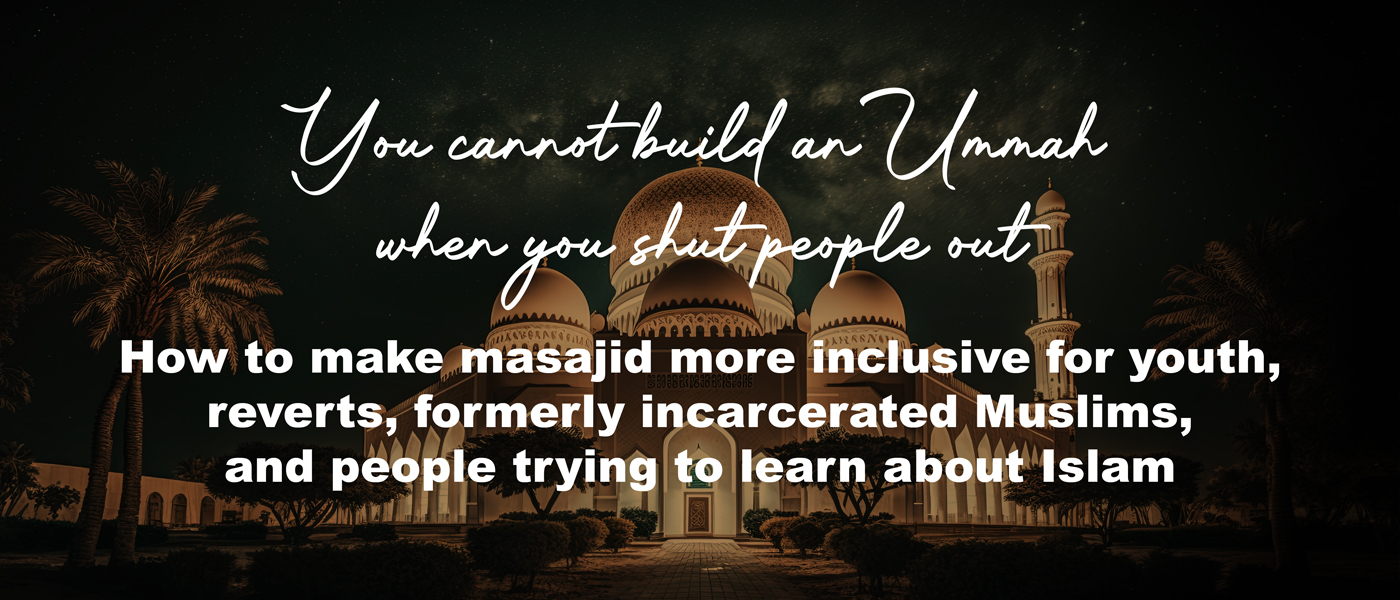How to make masajid more inclusive for youth, reverts, formerly incarcerated Muslims, and people trying to learn about Islam
One day, we were told the heartbreaking story of a young man who visited a mosque for the first time after being released from prison. He stood just outside the entrance of the mosque, tattoos adorned his face and were inked on his arms. His shoes were in his hand, and he was scanning the room for a familiar face – or any face, really – that might welcome him during such a nerve-wracking experience and transition. It was his first time attending prayers in congregation since embracing Islam just a few weeks earlier. The khutbah that he had watched online was inspiring, and it was said that the mosque was a place of brotherhood, peace, and unity. But now, standing there alone with the community seeming to ignore him, he wasn’t so sure.
He observed a group of older men, chatting in the corner in a language he didn’t understand. A few brothers glanced his way and then looked past him. No one came forward to greet him, no one asked him his name. Mustering up the courage, he went inside to quietly offer his prayers, and then he left before the last taslim had finished.
Some of you reading this might feel that loneliness and nervousness, too, if you’ve experienced this in the past. Unfortunately, that just goes to show that this isn’t a unique story. It is, sadly, experienced by far too many reverts who have left everything behind for Islam. Many get alienated in their own homes or are exiled, their friends don’t even support them because of stereotypes – where else do they have left to go? And if the very community that they’ve happily accepted isn’t warm and receptive to them, then we are at fault for the hurt they experience and must quickly rectify this wrong approach. These stories belong to the brother or sister who just got out of prison after years of reflection and repentance. Or, the teenager struggling to reconnect with their faith after feeling judged for so many years. For many, the masjid, a place that should be the heart of our community, feels like the most unwelcoming place.
That should not be the case.
If the Prophet (SAW) were here today, would he (SAW) walk past someone new without greeting them? Would he (SAW) let a brother feel invisible in the house of Allah (SWT)? Of course not! His masjid in Madinah was a refuge for the lonely, a sanctuary for the sinner, and a home for the hopeful. So why isn’t ours?
This article is a call to reflect, and to act. It’s a reminder that the masjid belongs to Allah (SWT) and everyone who seeks Him has a right to feel welcome. It’s also a guide on how we, as individuals and communities, can start building spaces that reflect the prophetic example of mercy, inclusion, and love for all.
Because no one should ever feel like an outsider in the house of Allah (SWT).
Understand who feels left out and why
New Muslims often revert to Islam with little to no support system and, those that do have one, are incredibly blessed. Their families may have distanced themselves if they see their daughter either observing the hijab, or if their son wants to pray five times a day and wants to consume halal meat. Based on what they’ve seen in the media, their understanding of Islam is still developing, and often incorrect. As a result, instead of embracing the person in their family who is going through such a monumental change, they either ignore them or treat them severely.
Formerly incarcerated Muslims often begin their journey towards Islam in prison, and they dedicate immense time and effort into learning, studying, applying, and practicing the faith. However, when they are released and they enter a masjid for the first time, they have reported feeling like they are under suspicion. These brothers and sisters need a community, not constant curiosity of what they’ve done.
Teenagers and young adults, on the other hand, are the groups that most masajid try to attract so that the youth may firmly hold onto their faith in the West. But they often feel as if these places are only for adults because they only see adults leading and organizing. They opine that their ideas aren’t heard, their styles are criticized, and their questions about deen are dismissed. The result? They stop coming altogether.
What the Sunnah of Rasulallah (SAW) teaches us
The Prophet (SAW) built a community where every Muslim, regardless of past sins, tribal status, or knowledge level, felt seen and supported. For example, we have Bilal ibn Rabah who was a former slave, yet was honored to call the adhan. Abdullah ibn Mas’ud was mocked for his thin legs, but the Prophet (SAW) said his weight on the scale would outweigh a mountain. When a young man came to the Prophet (SAW) asking for permission to commit sin, the Prophet (SAW) didn’t cause an uproar, nor did he (SAW) reject him. He (SAW) listened patiently and attentively, reasoned with him, and made sincere dua for him.
In a famous hadith he (SAW) has said, “Indeed, I was only sent to perfect good character.” (Musnad Ahmad)
The Prophet (SAW) didn’t just tolerate people, he (SAW) transformed them, and we must model the same behavior.
5 ways to make your masajid more welcoming
- Designate a “welcome team” – the best people to do this job are the youth! Every masjid should have active volunteers, young and old, who make it their mission to spot new faces and greet them warmly. When someone new arrives at the masjid, they can offer a brief tour, share a prayer schedule, and answer any questions in a judgment-free way.
- Start organizing events that are catered to those often excluded. There could be programs such as monthly sessions for new Muslims, returning Muslims, and curious youth with the resident scholar. Here, the basics of Islam can be taught/re-taught in a relaxed setting where everyone may ask questions openly. Serve the best food that everyone will enjoy, and let people socialize! This reduces intimidation and builds new confidence.
- Create a “buddy system.” Pair new Muslims or returning individuals with seasoned, compassionate mentors who are able to check in on them weekly, help them attend events, and offer spiritual/emotional support. The Prophet (SAW) has said, “The believer is a mirror to his brother.” (Abu Dawud)
- Train the community on akhlaq. Organize khutbahs and workshops that focus on not just ibadah, but on character and welcoming others. Remind the community that our mannerisms are dawah, and that can either draw people to Islam or push them away altogether.
- Give your youth a voice and leadership roles in the community. Establish a youth board within the masjid – not just for events, but for shaping the vision of the masjid itself. Let them plan, speak, ask questions, and even lead halaqahs for their peers under proper guidance. When the youth are trusted, they take ownership. When they are ignored, it is inevitable that they disconnect.
Quick wins for every Muslim in the masjid
You don’t need to be in charge of the masjid to make a difference. Here’s what you can do starting today:
- Smile and extend the greeting of salaam to someone you don’t know.
- Learn someone’s name and ask about their story.
- Avoid correcting people harshly, especially in public.
- Sit with someone who’s alone at Friday prayer.
- Support masjid programs for reverts and youth with your time, money, or skills.
Real belongings begin with you
Everyone has a role to play. The masjid’s atmosphere is not just built by the imam or the board, it’s built by every person who walks in the door. The Prophet (SAW) has said, “The most beloved of people to Allah are those who are most beneficial to others.” (Tabarani) If we want to attract people to the masjid, we need to ask, “Are we being beneficial? Are we being welcoming?”
No matter how many years we might have served, we do not own the masjid. It belongs to Allah (SWT), and He (SWT) invites every single person who turns to Him, regardless of their past, appearance, or knowledge. Allah (SWT) says in The Quran, “The places of worship are only for Allah, so do not invoke anyone besides Him.” (The Clear Quran®, 72:18)
Let’s stop acting like gatekeepers. Instead, be like the Prophet (SAW): a guide, a friend, and a light.
We can do better, and we must
The masjid should be the most welcoming place on earth for anyone seeking Allah (SWT). If someone leaves feeling judged or ignored, we’ve missed the mark. But the good news is we can change that. Let’s commit today to building masajid that reflect the mercy of the Prophet (SAW). Let’s welcome the broken, the curious, the young, the old, the returning, and the new. Because that’s not just community work. That’s prophetic work.
O Allah, make our masajid homes of Your mercy, beacons of Your guidance, and shelters for the vulnerable. Purify our hearts from judgment, and fill them with love for those who seek You. Grant us humility, gentleness, and compassion in word and deed. Make us a cause for guidance to the lost, a haven for those returning, and a support for those seeking Your light. Make us among those who revive the Sunnah of Your Prophet (SAW) in embracing hearts – not breaking them. Ameen!



